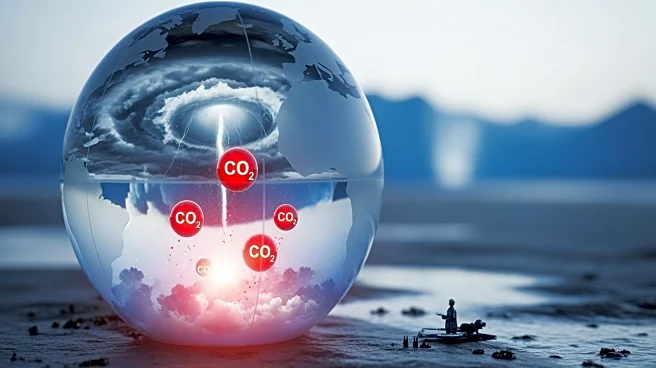What's Happening?
The World Meteorological Organization (WMO) has reported a significant increase in atmospheric carbon dioxide levels, reaching 423.9 parts per million (ppm) in 2024, the highest since measurements began
in 1957. This surge is attributed to emissions from fossil fuels, wildfires, and a reduced capacity of natural carbon sinks like oceans and forests. The WMO warns that the excess CO2 will exacerbate climate change, leading to more extreme weather conditions. Other greenhouse gases, such as methane and nitrous oxide, have also reached record levels, raising concerns about the global ability to meet the Paris Agreement's climate goals.
Why It's Important?
The record levels of CO2 and other greenhouse gases have significant implications for global climate policy and environmental stability. The increase in these gases is likely to accelerate climate change, resulting in more frequent and severe weather events. This poses a threat to economic security and community well-being, as industries and populations may face disruptions. The data underscores the urgency for policymakers to implement more effective emission reduction strategies to mitigate these impacts and work towards the goals set in the Paris Agreement.
What's Next?
The WMO's report is expected to prompt discussions at the upcoming United Nations climate conference, where policymakers will be urged to take more decisive action to reduce emissions. Despite some governments advocating for continued use of fossil fuels, there is a growing movement among businesses and local governments to combat global warming. However, the report indicates that current commitments are insufficient to address the severity of the climate crisis, suggesting that more robust measures are needed to prevent long-term temperature increases.
Beyond the Headlines
The report highlights a potential 'vicious climate cycle,' where increased emissions from wildfires and fossil fuels further diminish the planet's ability to absorb CO2, creating a feedback loop that accelerates climate change. This cycle could lead to a slow-moving climate catastrophe, emphasizing the need for comprehensive global strategies to enhance carbon sinks and reduce emissions. The ethical and environmental responsibilities of nations and industries are increasingly under scrutiny as the world grapples with these challenges.









